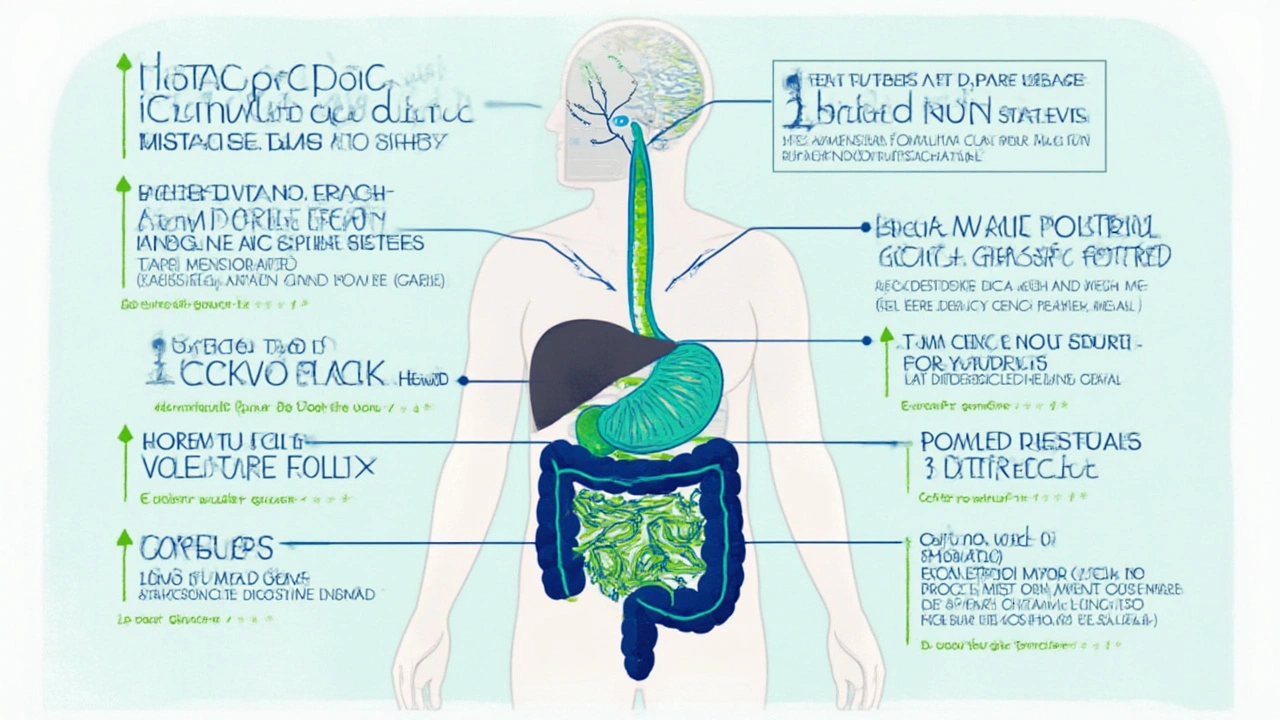Stomach acid has a habit of picking the worst possible moment to strike—like when you’re out at your favorite restaurant or just trying to enjoy a late-night snack. Suddenly, your chest burns, your throat aches, and you regret every spicy bite. For millions, the fix is grabbing a Pepcid tablet. This little pill has become a household name. But how did it get here, and what should you really know before relying on it?
Understanding Pepcid: How It Works and What It’s For
Pepcid is the brand name for a drug called famotidine. It’s one of those quiet heroes tucked away in people’s medicine cabinets. Famotidine belongs to a group known as H2 blockers. Put simply, it blocks certain signals in your stomach lining that tell your body to produce acid. Less acid means less burn. Simple, but genius.
The reason so many doctors recommend Pepcid isn’t just because it’s effective. It tends to cause fewer side effects than earlier heartburn remedies. If you compare it to older H2 blockers like cimetidine or ranitidine (the latter pulled from the shelves in 2020 due to contamination concerns), famotidine is still standing strong. There’s a reason it was the second most prescribed H2 blocker in the United States in 2023, according to a study in the American Journal of Gastroenterology.
Pepcid works fast—most people feel relief from heartburn within an hour after they chew or swallow a tablet. One 2022 clinical review showed that people who took Pepcid for acute acid reflux had symptom relief for up to 12 hours, compared to 6-8 hours from many over-the-counter antacids.
Heartburn isn’t its only job. Famotidine is also prescribed for GERD (gastroesophageal reflux disease), gastritis, peptic ulcers, and even sometimes to prevent ulcers for people who need regular painkillers. In hospitals, doctors might give famotidine by injection for people who can’t swallow or who’ve had surgery and need to protect the stomach lining.
But Pepcid isn’t magic. If you eat a hot-and-spicy double pepperoni pizza and follow it with a milkshake, don’t expect perfect peace. It gives you better odds, not a forcefield. So, how should you be using it?
How To Use Pepcid Safely (And What to Watch Out For)
The easiest way to get Pepcid is in one of those familiar pink and white boxes with “Maximum Strength” splashed across the front. Over-the-counter options come in doses of 10mg and 20mg, while prescription versions can go up to 40mg.
For occasional heartburn, one tablet with a glass of water is the usual advice. Many folks make the mistake of popping Pepcid after symptoms start, but it can be smarter to take it before eating trigger foods. The effect generally starts within 30–60 minutes. If you’re pressed for time, chewable tablets work a bit faster.
People with heartburn two or more times a week should check with a doctor, because you might need more than just symptom relief—a different class of medication or more testing for underlying issues could be on the table. For chronic cases, doctors sometimes combine Pepcid with drugs like omeprazole (a proton-pump inhibitor), but this should be supervised since mixing drugs can get tricky.
As for who shouldn’t take it? A few groups need to give Pepcid a second thought. Kids under 12 need a pediatrician’s advice first. The same goes for pregnant or breastfeeding women—famotidine is usually considered low-risk, but always check with your doctor. People with kidney problems should use a lower dose. That’s because your kidneys clear the drug out, and a high dose could build up in your body if they aren’t working well, leading to confusion and sometimes irregular heartbeat.
What about side effects? Most people do fine, but the most common issues are headache, dizziness, or mild diarrhea. Less common are changes in taste, muscle pain, or—rarely—serious allergic reactions. If you start itching like crazy or can’t breathe, skip the next dose and head to the ER.

Unpacking the Surprising Uses and Science Behind Pepcid
Famotidine’s story doesn’t stop at heartburn. Researchers and doctors have been getting creative. Famotidine can help calm hives or skin rashes in combination with antihistamines during severe allergic reactions—the blocks on acid production overlap with histamine receptors that cause itching. Some people with rare genetic issues that cause too much stomach acid (like Zollinger-Ellison syndrome) count on Pepcid for daily life.
In 2020, there was huge excitement about Pepcid’s possible antiviral properties—rumors flew that it might help COVID-19 patients recover faster. Hospitals ran small studies, but the data didn’t pan out. By 2022, bigger trials found no strong benefit compared to placebos. But the episode put Pepcid on the map for many folks who’d never thought twice about what was in their heartburn tablet.
Famotidine is very different from the old-school antacids like Tums or Rolaids. Rather than neutralizing acid already in your stomach, it goes straight to the chemical switch that tells your stomach to make it in the first place. That’s why you can use it for prevention, not just instant relief. Medical experts often suggest tablets before big, late-night dinners or foods with tomato sauce, onions, or citrus—classic triggers for acid reflux.
| Brand/Generic | Drug Class | Time to Effect | How Long It Lasts | Over-the-Counter? |
|---|---|---|---|---|
| Pepcid (famotidine) | H2 Blocker | 30-60 minutes | 10-12 hours | Yes |
| Tums (calcium carbonate) | Antacid | Immediate | 1-2 hours | Yes |
| Prilosec (omeprazole) | PPI | 1-4 days | 24 hours (daily dosing) | Yes |
Notice how Pepcid sits in a sweet spot: a bit slower than an antacid, but much faster than a PPI. Most folks care about that when guessing how soon they’ll feel better.
There’s another twist—Pepcid sometimes gets used for people who get acid reflux from painkillers like ibuprofen or aspirin. If you have to take NSAIDs long-term, your doctor might recommend a daily dose to cut your risk of ulcers.
Smart Strategies: Getting the Most Out of Pepcid
If you find yourself reaching for Pepcid more than twice a week, it’s time to dig a little deeper. Sometimes, heartburn isn’t just about what you eat—it’s how, when, and how much. Eating large meals late at night guarantees your stomach will push food up into your esophagus (especially when you lay down). Small, frequent meals help. Same with propping up your head on an extra pillow if heartburn wakes you at night.
Weight plays a role. Carrying extra pounds around your midsection puts pressure on your stomach, making acid leaks up more likely. Shedding even a few pounds can make a world of difference. Avoiding cigarette smoke, limiting alcohol, and skipping the second (or third) cup of coffee can also help tame symptoms.
Got a workout planned? Wait at least a couple of hours after a big meal; bending and straining can make reflux worse.
For travel, Pepcid’s shelf-stable packaging means you can toss a strip in your bag. Its long duration makes it a good choice for flights or long car rides where you can’t control your food options.
One hot tip: some people discover their heartburn isn’t always from acid. Bile reflux or even food allergies can mimic the symptoms. If Pepcid isn’t helping after a couple of weeks, don’t just take more—talk to your doctor. Persistent symptoms could signal ulcers, hiatal hernia, or rarely, esophageal cancer. That’s rare, but easy to miss if you keep self-treating.
- Take Pepcid 30–60 minutes before meals if you want to prevent heartburn.
- If you have accidental heartburn, chew a tablet for faster relief.
- Don’t double up doses—stick with the recommended amount.
- For chronic symptoms, consult a healthcare professional.
- Store it in a cool, dry place. It lasts long, but high humidity can ruin it.
There’s a reason Pepcid keeps hanging around on pharmacy shelves: it’s reliable, fast, and pretty safe for most adults. But your best defense is always paying attention to your own habits and triggers. Think of the little tablet as a tool, not a permission slip to eat and drink whatever you want without a care. When used wisely, Pepcid can give you long stretches of heartburn-free days—and some peace of mind next time someone brings out the spicy wings.
